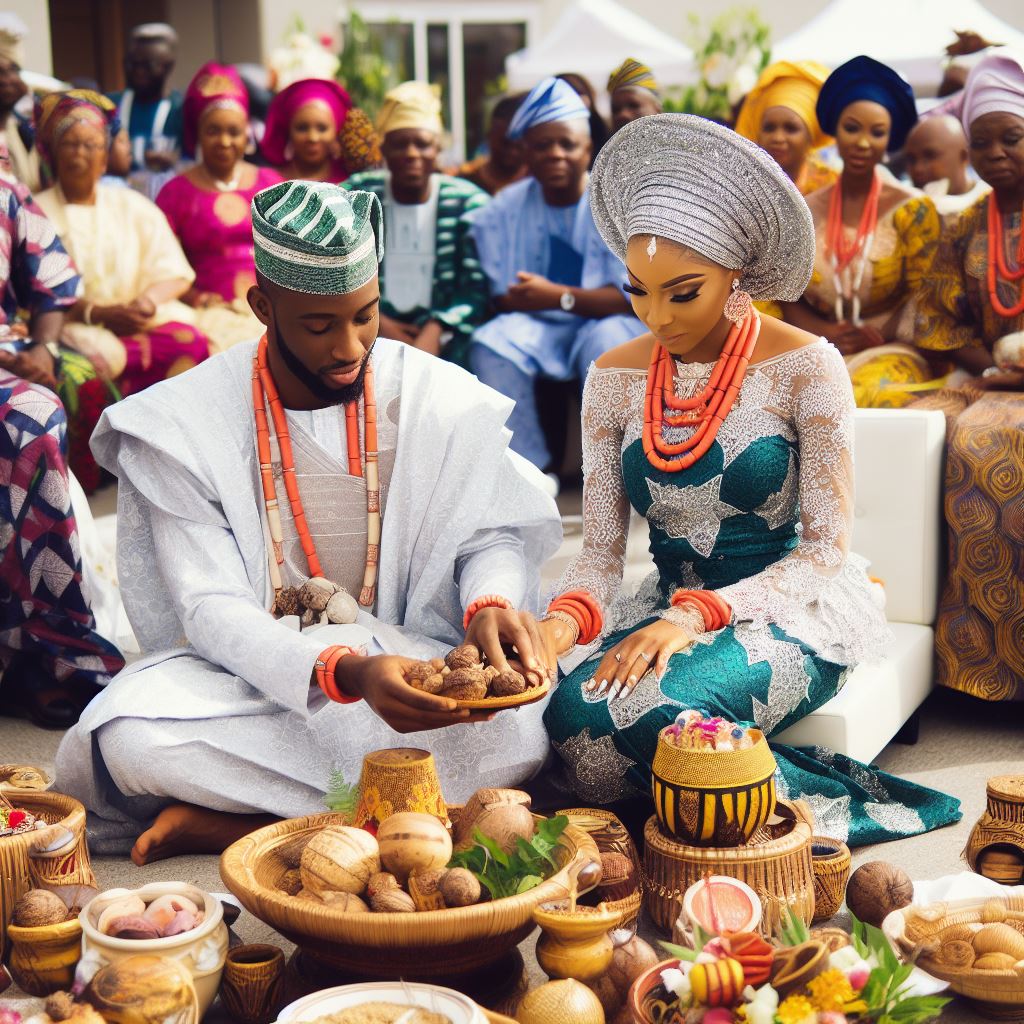Introduction
A marriage certificate, a formal legal document, serves as an official record of a marital union’s existence.
The significance of a marriage certificate extends beyond a mere piece of paper; it safeguards the rights and obligations of married individuals, providing a legal framework for various aspects of their lives.
Marriage in Nigeria is a cultural tapestry woven with diverse ethnic traditions and customs.
With a rich history and a multitude of ethnic groups, Nigeria’s approach to marriage is multifaceted.
It is not only a union between two individuals but a joining of families, communities, and sometimes even tribes.
The customs and ceremonies surrounding marriages differ greatly among ethnic groups, making Nigerian weddings vibrant and unique.
In this blog section, we’ll explore the legal implications of not possessing a marriage certificate in Nigeria.
Shedding light on the profound impact it can have on the lives of married couples within the context of the country’s rich cultural and legal landscape.
Legal Implications of Not Having a Marriage Certificate in Nigeria
Marriage Act of 1990 B. Marriage Registry
The Marriage Act of 1990, a pivotal piece of legislation, meticulously outlines the legal framework for marriages in Nigeria, encompassing the rules and regulations that govern these unions.
This Act is a comprehensive guide that ensures the orderly conduct of marriages in the country.
Marriage Registry
Registering at a Marriage Registry is a crucial step in the process. This formal registration is essential to establish the legal validity of the marriage.
It provides a transparent and standardized procedure for couples to solemnize their union within the bounds of the law.
Types of marriages recognized under Nigerian law
Nigerian law recognizes various types of marriages, and these distinctions have significant legal implications.
Statutory marriages are performed under the provisions of the Marriage Act and offer certain legal rights and protections to the parties involved.
Customary marriages, on the other hand, are rooted in tradition and can have distinct legal consequences.
Understanding the legal requirements for marriage in Nigeria is fundamental to comprehending the far-reaching implications of not having a marriage certificate.
The type of marriage one enters into can significantly impact property rights, inheritance, and even divorce proceedings.
In the subsequent sections of this blog section, we will delve deeper into the legal consequences and ramifications of not possessing a marriage certificate in Nigeria.
Shedding light on the challenges and complications that may arise when couples are not in compliance with the legal requirements.
Legal requirements for marriage in Nigeria
Marriage Act of 1990
The Marriage Act of 1990 is the primary legislation governing marriages in Nigeria. It sets out the legal requirements and procedures for a valid marriage in the country.
According to this act, a marriage is only recognized as valid if it is conducted in accordance with the provisions outlined.
Marriage Registry
In Nigeria, marriages must be registered at a Marriage Registry. This is a government office where couples can formalize their union and obtain a marriage certificate.
It is the responsibility of the couple to provide the necessary documents and information to the registry.
Types of marriages recognized under Nigerian law
Nigerian law recognizes two main types of marriages: statutory marriage and customary marriage.
Statutory marriage is conducted under the provisions of the Marriage Act and is usually officiated by a registrar at the Marriage Registry.
On the other hand, customary marriage is conducted according to the customs and traditions of the parties involved.
Statutory marriage requires certain legal requirements to be met.
These include:
- Minimum age: Both parties involved must be at least 21 years old. However, if either party is below 21, consent from their parents or guardians is required.
- Consent: Mutual consent of the parties involved is necessary for a valid statutory marriage.
- Notice of marriage: At least 21 days before the intended date of marriage, the couple must give notice to the registrar at the Marriage Registry.
This notice must include personal details such as names, addresses, occupations, and marital statuses. - Witnesses: Two witnesses who are at least 18 years old must be present during the marriage ceremony and sign the marriage register.
In addition to statutory marriage, Nigerian law also recognizes customary marriages.
Parties from ethnic groups follow customs for marriage, yet they must register customary marriages at a Marriage Registry for legal recognition.
Not having a valid marriage certificate in Nigeria can have several legal implications.
The law may not recognize the union without a marriage certificate, denying the couple legal rights and benefits.
For example, in the event of separation or divorce, the absence of a marriage certificate can complicate property division and child custody matters.
Furthermore, not having a marriage certificate may affect issues related to inheritance and succession.
Without proper documentation, the surviving spouse may face difficulties in claiming inheritances or other entitlements.
Read: Grace, Love, and Unity: Biblical Keys for Marriage
Consequences of not having a marriage certificate
In Nigeria, the absence of a marriage certificate can have significant legal implications.
This section explores the consequences of not having a marriage certificate, focusing on lack of legal recognition, issues with child custody and inheritance, and difficulties related to divorce or separation.
Lack of legal recognition
1. Inability to claim certain rights and benefits
Without a marriage certificate, couples may face difficulties in accessing various rights and benefits provided by the law.
These can include social security benefits, healthcare coverage, and tax benefits that are typically available to married couples.
2. Challenges in property ownership
In the absence of a marriage certificate, couples may encounter obstacles in acquiring or transferring property.
The certificate serves as evidence of the marital status and provides legal protection when dealing with property matters.
Without it, disputes and challenges can arise, potentially leading to financial losses or the inability to assert ownership rights.
3. Issues with child custody and inheritance
Not having a marriage certificate can complicate child custody cases and inheritance matters.
If a dispute or separation occurs, the non-certified partner might struggle to assert parental rights or gain legal guardian recognition.
Additionally, without a marriage certificate, children may face challenges in inheritance claims, potentially leading to unfair distribution or exclusion from inheritance rights.
Difficulties related to divorce or separation
1. Laws and Processes Governing Divorce in Nigeria
A marriage certificate plays a crucial role in divorce proceedings.
It serves as proof of the existence of a legally recognized marriage, and without it, the divorce process can become complicated.
The lack of a marriage certificate can lead to delays and uncertainties in legally dissolving a marriage.
2. Lack of legal protection for the non-certified spouse
In the absence of a marriage certificate, the non-certified spouse may face difficulties in seeking legal protection in the event of a divorce or separation.
This can result in unequal distribution of assets, inadequate spousal support, and limited access to child custody rights.
The certified spouse, on the other hand, may be at an advantage due to the legal recognition conferred by the marriage certificate.
Not having a marriage certificate in Nigeria carries significant legal implications.
It can result in the lack of legal recognition, difficulties in child custody and inheritance matters, and challenges in divorce or separation proceedings.
Couples are strongly advised to obtain a marriage certificate to ensure their legal rights and protection.
Read: From Adam and Eve: Lessons on Marriage in the Bible
Rights and benefits associated with a marriage certificate
A marriage certificate not only serves as a proof of marriage but also bestows several legal rights and benefits upon the couple.
From proof of marital status to access to financial benefits and social security schemes, having a marriage certificate in Nigeria comes with numerous advantages.
Proof of marital status
One of the primary benefits of possessing a marriage certificate in Nigeria is the proof of marital status it provides.
This document serves as official evidence that a legal marriage has taken place between two individuals. It can be presented whenever required to establish the legitimacy of the marital relationship.
Without a marriage certificate, individuals might face challenges while navigating bureaucratic processes and legal matters that necessitate proof of marriage.
Possessing a marriage certificate ensures smooth interactions with governmental and non-governmental organizations.
Legal safeguards in case of disputes or dissolution
Another crucial advantage of having a marriage certificate in Nigeria is the legal protection it offers to couples in case of disputes or dissolution of marriage.
It forms a legal basis for resolving conflicts related to property, child custody, and other rights and obligations.
In the absence of a marriage certificate, couples may find themselves at a disadvantage when seeking legal redress.
A marriage certificate strengthens their position in legal proceedings related to divorce, inheritance, and property division, ensuring fair treatment.
Access to financial benefits and social security schemes
A marriage certificate enables couples to access various financial benefits and social security schemes provided by the government, employers, and other entities.
These benefits can range from tax advantages to spousal health insurance coverage.
Financial institutions often require a marriage certificate to facilitate joint bank accounts, loans, and mortgage applications.
With a marriage certificate, couples can enjoy shared financial resources, making it easier to plan and manage their finances together.
Moreover, a marriage certificate opens eligibility to social security schemes, such as retirement plans, pension funds, and survivor benefits.
It ensures that both spouses are entitled to these benefits, safeguarding their financial well-being in the long run.
Obtaining a marriage certificate in Nigeria not only acts as a proof of marital status but also grants couples various legal rights and benefits.
It serves as a protective legal document in case of disputes, facilitates access to financial resources, and ensures eligibility for social security schemes.
Understanding the importance of a marriage certificate can empower couples to secure their legal and financial well-being.
Read: Heartfelt Marriage Prayers and Their Bible Origins

Steps to obtain a marriage certificate in Nigeria
Pre-marriage requirements
- Undergo pre-marital counseling with a recognized religious body or a marriage registry.
- Provide evidence of having legally separated or divorced if applicable.
- Obtain parental consent for individuals below the legal marriage age.
Registration process
- Choose between a religious or civil marriage ceremony, which affects where the registration will take place.
- Visit the registry or religious institution where the marriage will be conducted.
- Fill out the required forms, providing accurate information about both parties.
- Present the necessary documents to the registry or religious body.
- Pay the required fees for registration and obtain a receipt.
- Fix a date for the marriage ceremony, ensuring it falls within three months of registration.
Cost and time involved
- Couples should budget additional expenses for document processing, transportation, and other logistics.
- The entire process, from gathering documents to obtaining the certificate, can take several weeks to months.
- Longer processing times may occur if there are delays in document verification or in scheduling the ceremony.
Importance of keeping the certificate safe
- A valid marriage requires the marriage certificate, a crucial legal proof, for numerous essential legal procedures.
- It is necessary for obtaining passports, visas, and other forms of identification for the spouse.
- The certificate may be required for inheritance claims, property ownership, and spousal benefits.
- It acts as evidence of eligibility for joint bank accounts, insurance claims, and other financial matters.
- Loss or damage to the certificate may result in costly and time-consuming efforts to obtain a replacement.
Obtaining a marriage certificate in Nigeria involves several steps, starting with fulfilling the pre-marriage requirements.
These requirements include gathering necessary documents such as age declaration, identification cards, passport photographs, and birth certificates.
There is a registration fee that varies depending on the location, ranging from ₦5,000 to ₦50,000. It is important to budget for additional expenses, including document processing and transportation.
Read: Couples of the Bible: Stories and Marriage Verses
Conclusion
Recap of the legal implications of not having a marriage certificate
Not having a marriage certificate in Nigeria can lead to various legal troubles. It can result in difficulties in proving the legal union, especially in cases of divorce or inheritance.
Individuals may lose certain spousal rights or benefits without a marriage certificate.
The significance of obtaining and keeping a marriage certificate
A marriage certificate serves as tangible proof of the marital status and legal recognition.
It provides security and protection for both spouses and their rights. The certificate is crucial in ensuring the legitimacy of the marriage and safeguarding interests.
Encourage readers to prioritize legal documentation in their marriages
Obtaining a marriage certificate should be a priority for couples planning to marry. It is essential to follow the legal requirements and complete the registration process.
Having a valid marriage certificate ensures peace of mind and avoids potential legal complications.
By prioritizing legal documentation, couples can protect their rights and secure their future. Remember, a marriage certificate is more than just a piece of paper; it represents legal recognition.
Therefore, make sure to obtain and keep a valid marriage certificate for a trouble-free marital journey.




